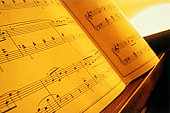
Home > Ear Training
|
Essential Ear Training For Pianists(Scroll down to see the full list of lessons in this section)
While practicing you are also training your ears, so listen closely to each note while playing. To correctly train your ears you must be able to recognize intervals while playing a song on the piano. You will be unable to continue with your piano training if you are unable to recognize these intervals. The ability to hear and identify intervals in pieces of piano music is one of the most difficult elements to learn. Piano ear training will allow you to repeat sections of music by simply listening to somebody else play. For easy piano pieces, you will no longer have to resort to sheets of music. By simply listening to them, you will be able to reproduce them without failure. If you desire to play songs without sheets of music, you will have to train your ear to hear the distances between each note. Many pianists struggle with this element, keeping them from acquiring new skills. Practice by attempting to recreate simple songs from children’s CD or go online where you can find various exercises and games aimed at training your ears. While training your ears to recognize intervals, you will also want to train them to differentiate melodies and chords. This will teach you how to judge relative pitch and will ultimately aid in your ability to identify specific chords.
Training your ears is not a simple matter; therefore, don’t feel discouraged if you can’t find the melody right away. Chord practices are very similar, listen to recordings of a chord and try to replicate the sound. Once you have found the correct chord you are one step closer in training your ears. Piano ear training is a difficult task for any beginner and requires perfect pitch. If you are unable to acquire a perfect pitch, work on developing a relative pitch. This means that you will find a note that is relative to the reference note. You may not be able to recreate a tune perfectly; however, you will be able to play a kindred version. There are a variety of different exercises used to practice ear training. You can attempt to play a familiar song with your eyes closes. This exercise will train your ears to recognize mistakes and your brain to create an image of sheet of music. Playing with other pianists is always a great way to practice, simply have them play a short piece, followed by your attempt to recreate. The more you practice, the better you will become. Learn to Play Piano by Ear - Easy Lesson to Help You Out:
|
|
Although every attempt has been made to make information as accurate as possible, we are not responsible for any errors that may appear.
 To successfully progress through your piano lessons you will have to
To successfully progress through your piano lessons you will have to 
 You will most likely have to rely on additional resources in order to master
the ability to recognize notes. Recordings of pitch practice or interactive games online will help you to
identify certain notes and chords by playing a melody and asking you to repeat it. Once you feel comfortable
with the melody, continue to the next exercise.
You will most likely have to rely on additional resources in order to master
the ability to recognize notes. Recordings of pitch practice or interactive games online will help you to
identify certain notes and chords by playing a melody and asking you to repeat it. Once you feel comfortable
with the melody, continue to the next exercise.



